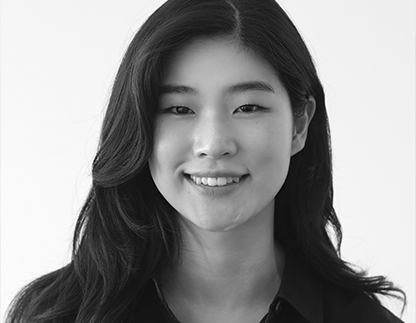I wanted to be a pianist when I was six years old, then a violinist in middle school, and then a composer in undergraduate. I guess I always wanted to be a musician from a very young age”
Wan Heo (she/her)
PhD Student in the Composition and Music Technology Program

Wan Heo is a PhD student in the Composition and Music Technology Program in the Bienen School of Music. Her compositions often use non-traditional notation, which expresses her interest in the linear organization of each piece and how it works with the investigation of timbre and spatiality. Wan's current research examines how Korean ancestors considered the environment by traveling to and recording sounds at significant sites in South Korea's mountains.
How would you describe your research and/or work to a non-academic audience?
I write music, usually for solo instruments or chamber ensembles. Music composing often includes music analysis, research on the instruments that I am writing for, and collaboration with instrumentalists. Workshopping and discussing with the performers about techniques on the instruments to find sounds that I want to create are important steps for me in the writing process. Also, I am hoping to build and consistently grow my own creative database through research. My current research project investigates the soundscapes of seven Buddhist monasteries in South Korea that were selected as UNESCO cultural heritage sites in 2018. As if part of each mountain’s ecology, these monasteries are carved into the mountains, whose soundscapes are unique; they are composed of natural sounds and the sounds of spiritual practice. I make field recordings at the monasteries, inspired by listening to them, and analyze them to prepare materials for my composition.
What do you find both rewarding and challenging about your research and/or work?
I find it rewarding to be engaged in a new music community in which people are so passionate about what they are doing and supportive of each other. I feel particularly privileged to be involved in Chicago’s new music scene, which is truly vibrant. On the other hand, I find it challenging when I have to be creative and inspired while I am exhausted both mentally and emotionally. This happens when I have back-to-back deadlines for new works, and the fact that they will all be presented in a concert hall setting with an audience makes me anxious and overwhelmed sometimes.
Why Northwestern?
Northwestern’s music composition program has a friendly and supportive community that was immediately noticeable during my onsite interview. PhD students are deliberately selected to have distinctive aesthetics and styles from each other, which I think is helpful to form a supportive environment rather than a competitive one. Moreover, it is certainly beneficial to be located near Chicago and be able to be involved in the new music scene. Most PhD student composers at Northwestern are often collaborating with musicians/artists based in Chicago, and they make their own opportunities to present their works at various new music venues outside of campus. Plus, Northwestern has great programs across disciplines, which is perfect for people who are interested in multidisciplinary work like me.
What books are on your bedside table?
NATURE edited by Jeffrey Kastner, The Book of Noise by Murray R. Schafer, A Brunch with a Monk by
Jihyun Bahn, and To the World that Tells Me I am Wrong by Jiwoo Jung
What inspires you?
I love reading essays by artists because they are always very inspiring. I also like traveling, hiking, and learning new things, which all make me inspired.
What did you originally want to be when you grew up?
I wanted to be a pianist when I was six years old, then a violinist in middle school, and then a composer in undergraduate. I guess I always wanted to be a musician from a very young age. There was one time when I was 10 that I told my parents that I was going to be a rock climber because I was learning it back then and I think I really enjoyed it, but my parents convinced me to keep pursuing music, haha.
Tell us about a current achievement or something you're working on that excites you
I recently started a graduate artist collective here at Northwestern called Arts Across the Arch with Serena Simpson (an alumna from the MFA in Creative Writing) supported by the Kaplan Institute for the Humanities. I was connected to Serena when I started my work as an interdisciplinary graduate assistant at Kaplan, and as soon as I heard about her desire to build a community to support, collaborate, and network, I really wanted to make it happen. After the successful inaugural event back in January, we held a second gathering in April, and I am hopeful to sustain the collective further. Check us out on the Kaplan website!
Published: May 30, 2023
If you know a graduate student, postdoctoral trainee, graduate faculty member, staff member, or a member of our TGS alumni population who would make a great candidate for our TGS Spotlight Series, please complete this brief TGS Spotlight Series Nomination Form.